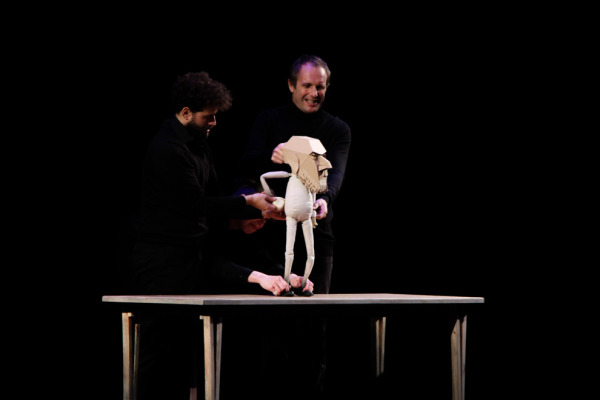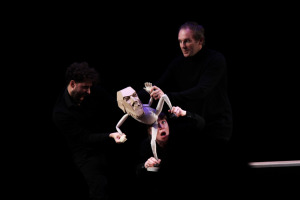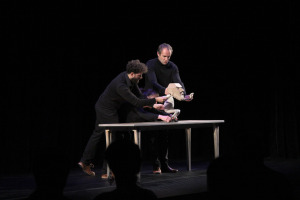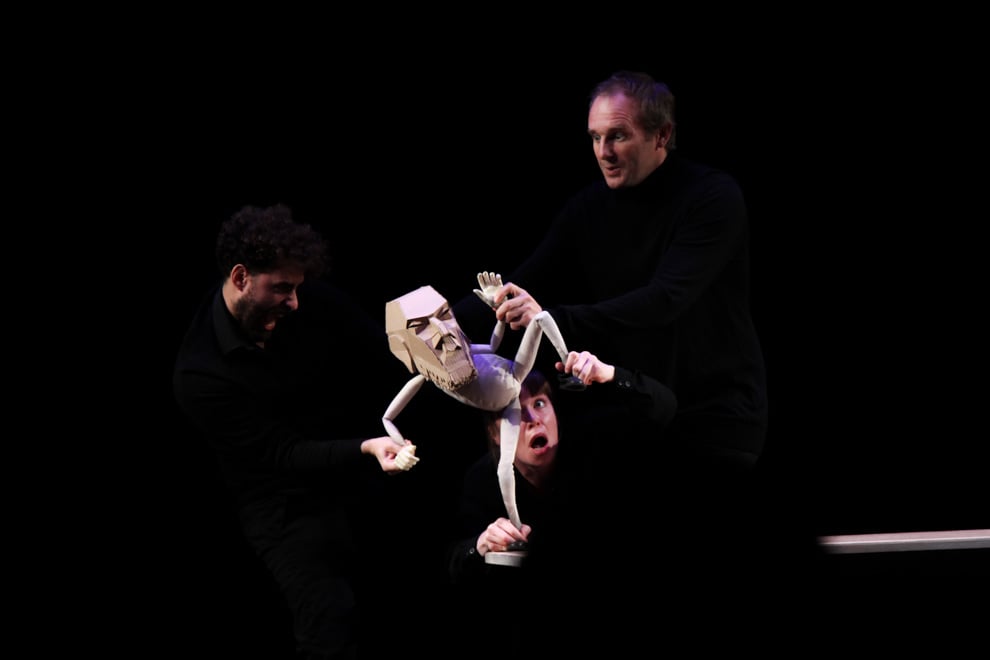
Among the list of concerts, plays and exhibits lined up on campus, “The Table,” put on by Blind Summit Theater, is a refreshing blend of puppetry, theater, stand-up comedy and improvisation. Meet the protagonist Moses — he is destined to lead the Exodus, and is also a cranky and vulgar old man whose head is made of cardboard. For an hour and a half at Bing Studio from Oct. 30 until Nov. 2, Moses narrates his own life story on a single spotlighted table, transporting the audience to a magical place where the movement of the hands seems only coincidental to the life of a puppet. Aside from several issues that seem to arise from the aimlessness of the show, “The Table” is ultimately what it sets out to be — a spectacle of puppetry at its finest.
As a warning, the plot of the “The Table” is almost non-existent, but “The Table” is meant to be more than a piece of theater — it is a show of puppetry mastery. And puppetry mastery it is. Moses comes to life with Mark Down as Moses’s voice and manipulating his head and left arm, Irena Stratieva controlling his feet and Sean Garratt doing his right arm and torso. His body language is not only convincing, but he gyrates, thrusts his hips, spins on a playing record and moonwalks. He’s so real that he appears to be enchanted.
Even better is Moses during the improvised bits of the show. At one point where he runs from Garratt, Stratieva yanks Moses’s feet onto the ground and under the table, forcing Down to follow suit and crawl behind the puppet in order to control Moses’s head. Even then, with two adults clunkering behind him, Moses has a life of his own.

While the sheer skill of the three puppeteers was undeniable, the show was impeded by several crucial elements. The first was the aimlessness of the show — not plotlessness, but rather, bad construction. Pieces of the Thursday show of “The Table” seemed forced — for instance, Garrett disappears for a quarter of the show and proceeds to have a bizarre and stilted exchange with Moses — either Garrett lacked a witty response or Moses was simply relentless. “Verbal abuse” is the best way to describe this part of the show, and it was uncomfortable to watch. This bad improvisation temporarily overshadowed the otherwise fine performance.
Perhaps because of this plotlessness, there seemed to be several running gags forced onto the show in an attempt to move forward the agenda — in particular, the Thursday show involved catcalling and harassing a lady in the audience at the beginning and in the middle of the show. “Moses” eventually cajoled her into taking puppeteer Sean Garratt’s place at one of Moses’s hands and his torso — more specifically, his “bum,” as Moses had said. The only reason Moses and his puppeteers came away clean with this was because Moses was a puppet — yet this was too much of a phenomenon to pass unnoticed, further drawing attention away from the puppetry and toward the plain meanness of Moses.

Yet while Moses was mean, he was also frank. From his quipping about working at children’s birthday parties to his despair when Garratt left him temporarily — “But you’re my right hand man!” — Moses manages to transform from a puppet with a bad personality to an insecure, flawed and lovable protagonist. Despite the blank slate of a table, Moses and the three puppeteers convincingly converted the tabletop into gardens, rooms, mountaintops through sheer imagination.
And among Moses’s whining and bumbling there lay poetic lines — for instance, when describing the art of puppetry: “All movement begins with movement of breath.” There is no better way to encapsulate the magic of “The Table.” Movement began with the taking in of breath, and once moved, so our breath was taken away.
“The Table” will be showing until Sunday, Nov. 2. Tickets must be pre-ordered online or over phone, $15 for students and $65 for general admission.
